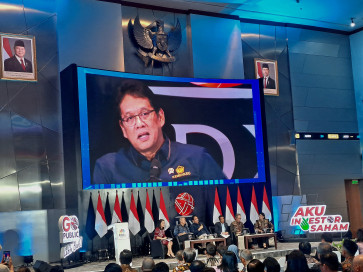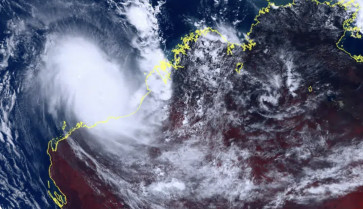Popular Reads
Top Results
Can't find what you're looking for?
View all search resultsPopular Reads
Top Results
Can't find what you're looking for?
View all search resultsAnalysis: The truth about Internet usage in Indonesia
There was a time not so long ago when the internet was proclaimed instant game-changer for just about everything, everywhere
Change text size
Gift Premium Articles
to Anyone
T
here was a time not so long ago when the internet was proclaimed instant game-changer for just about everything, everywhere. Tens of success stories have become global legends, hundreds more are on their way to becoming local successes. Thousands of painful failures have been forgotten. Along the way, we’ve re-learned some simple lessons. You can sell juicy tomatoes or fresh fish online, but only wholesale and not retail. Conversely, brick-and-mortar retailers are discovering to their peril that women can choose two sizes of the same pair of shoes online, keep the one that fits and the other “return-to-sender”.
With e-commerce in its infancy in Indonesia, it’s time for a virtual reality check. Topline comparisons of internet usage within the region tell us that we are way ahead of India but way behind South Korea. Climbing rapidly in the last two years, 20 percent of Indonesians 14 years of age and older now access the Internet every month. That’s over 30 million people, and growing steadily each month. But we need to remember two important facts that characterise the usage. First, roughly 10 of the 30 million users access the Internet via their mobile phones. Second, roughly 70 percent of those 30 million users visit Facebook each month, making it the most popular address in the country. If you connect the two facts, you might agree with some conclusions I have drawn.
There’s an awful lot of idle chatter on the ether, especially in Indonesia. There are lots of people posting pictures, exchanging gossip and the like. The “like” is mostly harmless and innocuous stuff. From a marketing perspective, this is all well and good, but where are the sales? Indonesians are not unique, Americans are similar. Unable to get any traction, the mighty General Motors recently announced the withdrawal of their marketing dollars from Facebook.
They know a thing or two about marketing and advertising, I’ve met a few on the team in Chicago. The trouble is that while millions wander through Facebook every minute of the day, the products and services masquerading as “people” remain faceless. For their efforts, another giant got mired in a PR disaster last week, thanks to a fake site that among other things proclaimed that birds were like natural sponges sucking up oil from spills in the oceans. A politician with a Facebook page can generate traffic, but have you ever wondered what kind of person would visit a creature called “Coca-Cola”? Personally, I believe that Facebook will remain the giant pie-in-the-sky till such time the owners show marketers how to use the medium. Like Google finally did, with “adwords” for example.
Google is a forum that all stakeholders can come to grips with ease. Users know what to expect from the various functions it offers. Marketers know what’s available where and for how much. Almost every cent spent on Google can be accounted for. It took the owners a while to monetize the behemoth, so here’s hoping Facebook will get there in the end. Till they do, tread with caution as a marketer and enjoy the fun as a user. If that’s your kind of entertainment. In Indonesia, Google is the second-most popular site for local visitors with 62 percent of our netizens wandering through each month. Yahoo follows with 37 percent, then YouTube with 30, Twitter with 16, and 4Shared with 15. The first six are all global sites, till we get to detik.com. There’s nothing like a local Amazon, an e-Bay or a Monster in between.
By the time we get to see an Indonesian business feature in the Top 10 rankings, there’s a gut-wrenching drop to No.7 with just 7 percent of traffic. That detik.com is news and the news-leader online has such a small audience is a telling comment on the state of local e-commerce. The “Local Top 10” rankings illustrate both the problem and the opportunity. Other than detik.com and kompas.com, the big local sites have fallen into the classic trap of being greedy. They are generalists, not specialists. They try to be all things to all people. They lack focus, a sense of purpose. Kaskus.co.id is a “community”, trying to do too much. Tokobagus.com follows suit literally by trying to sell everything, from shiny new mannequins to classic old Jaguars and everything else in between.
The time has come to build business-focussed sites. Staring at us are the obvious opportunities: real estate, automotive, fashion. A single business that has made it to the “Local Top 10” is KlikBCA at No 9, with 1.1 percent of visitors. At No.10 is plasa.com, a cyber-shopping mall. Small today, but an indicator of what the future holds. More entrepreneurs would do well to grab these opportunities today, in partnership with the cellular networks if need be. Only when they add up to more traffic and more usage will advertisers follow with long-term plans and significant budgets. While we get there, treat all the hype with extreme caution.
These conclusions are influenced by Roy Morgan Single Source, the country’s largest syndicated survey. More than 26,000 respondents are interviewed every year, week after week. The data is projected to reflect 87 percent of the population 14 years of age and over.
The writer can be contacted at debnath.guharoy@roymorgan.com










